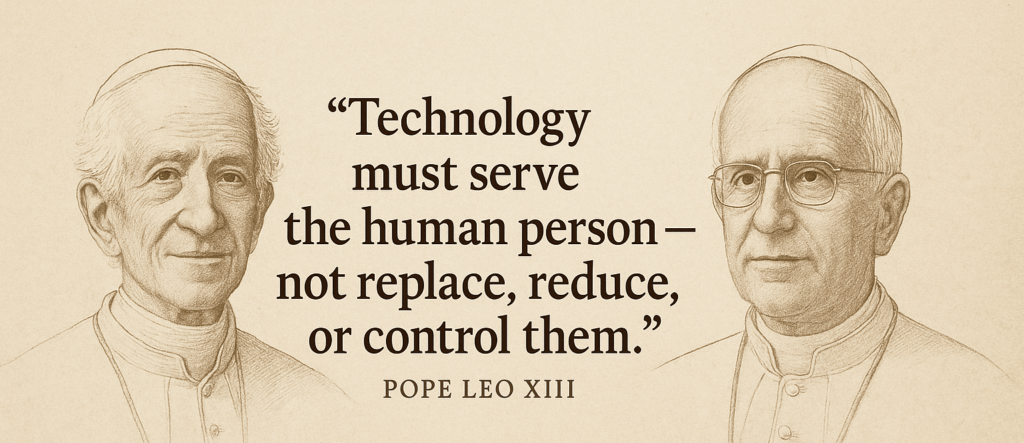From Factory Floors to Algorithms: Why Pope Leo XIV’s Choice of Name Matters in the Age of AI

When Pope Leo XIV stepped onto the balcony of St. Peter’s Basilica, the choice of his papal name sent an unmistakable message to the world.
By naming himself after Pope Leo XIII, the new pontiff wasn’t just honoring history—he was reviving a legacy. A legacy rooted in social justice, labor rights, and the defense of human dignity in the face of rapid technological upheaval.
But while Pope Leo XIII addressed the moral crises of the Industrial Revolution, Pope Leo XIV is stepping into a new era—the AI Revolution. And once again, the Catholic Church is calling the world to pause, reflect, and act with moral clarity.
A Legacy of Moral Leadership in Times of Change
Pope Leo XIII’s groundbreaking encyclical Rerum Novarum (1891) responded to the human cost of industrial capitalism. As factories replaced farms, and machines displaced livelihoods, Leo XIII advocated for:
- Workers’ rights to fair wages and safe conditions,
- The dignity of labor over exploitation,
- The moral responsibilities of both capital and government.
He stood as a rare voice unafraid to challenge economic systems in the name of human dignity.
Today, Pope Leo XIV carries that torch forward—but instead of smokestacks and steel mills, the threats now come from data centers, algorithms, and autonomous systems.
A Revolution Without Smoke—But Not Without Risk
The AI revolution is unfolding faster than any technological shift in human history. It touches everything—our jobs, our identities, our relationships, even our perception of truth.
What’s at stake?
- The erosion of privacy through surveillance technologies,
- Algorithmic discrimination that deepens inequality,
- Automation that displaces workers without safety nets,
- And perhaps most dangerously, a slow drift toward ethical relativism, where “what can be built” overshadows “what should be built.”
It is in this moment that Pope Leo XIV’s focus on AI ethics is not just timely—it’s prophetic.
A Spiritual and Ethical Call in a Digital Age
By prioritizing AI ethics as a central theme of his papacy, Pope Leo XIV is sounding an alarm:
“Let us pray that the use of the new technologies will not replace human relationships, will respect the dignity of the person, and will help us face the crises of our times.”
In a world where profit often overrides principle, and where algorithms shape everything from hiring decisions to warfare, the Church is reasserting a critical truth: ethics and alignment are not optional—they are essential.
Just as Pope Leo XIII challenged economic powers to recognize the soul in the worker, Pope Leo XIV is calling technologists, investors, and world leaders to recognize the soul in the data—the people behind the profiles, the faces behind the facial recognition systems, the dignity behind the digits.
Why This Moment Matters
The AI revolution may be our final technological revolution—one that changes not just how we work or communicate, but what it means to be human.
Without alignment to core values—human rights, empathy, justice, and truth—we risk creating systems that:
- Enshrine bias instead of justice,
- Manipulate rather than liberate,
- And centralize power in the hands of the few, while marginalizing the many.
Pope Leo XIV’s message is clear: The soul must not be outsourced. Ethics must be embedded from the ground up.
A Papacy for the Future of Humanity
In choosing the name Leo, the new pope signals continuity—not with nostalgia, but with conviction. He reminds us that every revolution—industrial or digital—requires moral courage.
And in elevating AI ethics as a core priority of his spiritual leadership, Pope Leo XIV is urging us to build a future where:
- Human dignity is not an afterthought, but the foundation.
- Technology enhances justice, rather than undermining it.
- Innovation walks hand in hand with compassion.
This isn’t just a message for Catholics. It’s a message for all of us—engineers, CEOs, educators, policymakers, artists, and activists.
Because the question is no longer whether AI will shape the world. It’s what kind of world we want it to shape—and who we are willing to become in the process.
May this new papacy not just echo the wisdom of the past, but illuminate a path forward where ethics, alignment, and human rights are not sidelines—but sacred responsibilities.
